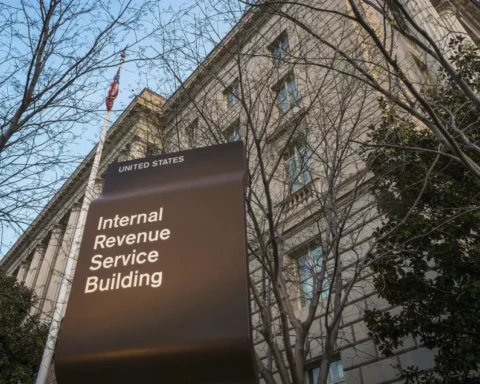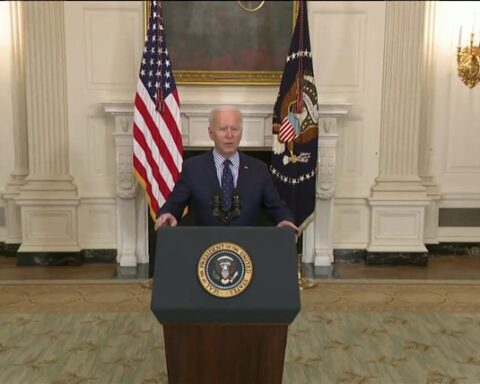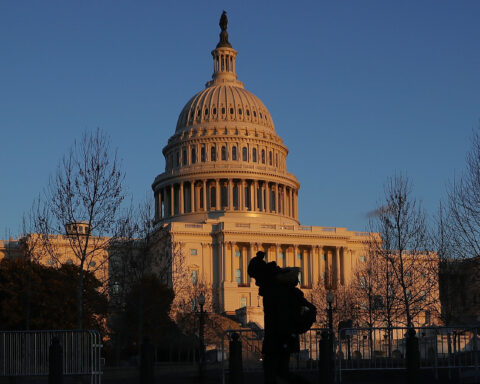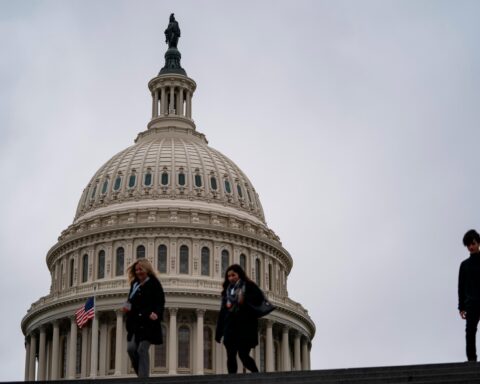Two different Americas are waiting on lifelines.
For part of the country, it’s a literal shot in the arm — the vaccine. For the other it’s a metaphorical shot — the new stimulus package that will help keep them going while we’re stuck in the Covid economy.
Tuesday’s CNN town hall was President Joe Biden’s moment to move on from the impeachment trial that wrapped up over the weekend.
Here are 6 of Biden’s top priorities
On vaccines: CNN reached out to all 50 states about what their health departments would like to see from the Biden administration. Read the full report here. One challenge is having the state system talk to the federal system. “Our vaccination program has been extremely successful, but it doesn’t show up that way on the CDC Covid Tracker,” Dr. Lee Norman of the Kansas health department told CNN.
Another key line from CNN’s report: Multiple states also informed CNN that they had learned about changes to federal programs secondhand through the media or with very little advance notice, leaving them scrambling to adapt.
On stimulus: CNN reported Tuesday: The full House may pass the legislation as soon as next week, but it could face hurdles in the Senate, where Democrats can’t afford to lose a single member of their party thanks to the 50-50 split in the chamber. Already, two Democrats — Sens. Kyrsten Sinema of Arizona and Joe Manchin of West Virginia — have voiced opposition to one element of the plan, raising the federal minimum wage to $15 an hour.
The Texas blackout will affect everyone
Millions of Texans are without electricity.
Nature threw humans a global pandemic that has kept kids in the richest nation on earth from attending school. Now it’s delivered a polar vortex that shut off power in Texas, the power center of the United States, which is the energy creation center of the world.
Power has a lot to do with power. And climate change.
It’s no coincidence that the current richest person on the planet — Elon Musk — started an electric car company. And we should note here that Musk recently announced he’d be relocating to Texas. (Lower taxes! Less regulation!)
The direct reason for the power outages in Texas is that a warm weather state was hit by a snowstorm and it wasn’t prepared. But power — and the complicated way we all get it — is both a periodically interesting issue (Enron, California blackouts, utility lines causing wildfires) and also an increasingly important one as we face climate change and try to pivot the country to emit fewer greenhouse gases.
But I will admit to knowing very little about how the electricity gets from wherever it starts to the light switch in my house.
I read and then reread this story from CNN’s Matt Egan on the situation Texas is facing now. I’ve put excerpts below in italics. My Cliff’s Notes are in bold.
Top producer of gas and wind goes dark. Texas is the No. 1 US state in both crude oil and natural gas, according to the US Energy Information Administration. The state accounted for a staggering 41% of America’s oil production in 2019 and a quarter of its marketed natural gas output.
Wind power is also booming in Texas, which produced about 28% of all the US wind-powered electricity in 2019, the EIA said.
What happens when a warm-weather energy producer freezes? That means its infrastructure is ill-prepared for the cold spell currently wreaking havoc. And the consequences are being felt by millions.
Wind power fail: Critics of renewable energy have pointed out that wind turbines have frozen or needed to be shut down due to the extreme weather.
And that is significant because almost a quarter (23%) of the power in Texas last year was generated by wind power, according to the Electric Reliability Council of Texas (ERCOT).
Even though other places with colder weather (like Iowa and Denmark) rely on wind for even larger shares of power, experts said the turbines in Texas were not winterized for the unexpected freeze. Cold weather protection like antifreeze and heating elements within the turbine blades and components are not commonly used in Texas.
Gas and coal power fail: Natural gas and coal-fired power plants need water to stay online. Yet those water facilities froze in the cold temperatures and others lost access to the electricity they require to operate.
“The ability of some companies that generate the power has been frozen. This includes the natural gas & coal generators,” Texas Gov. Greg Abbott wrote on Twitter.
And that’s an even bigger deal to Texas than frozen wind turbines because combined cycle natural gas (40%) and coal (18%) generated more than half of the state’s power in 2020, according to ERCOT.
Nuclear power fail: Nuclear also depends on water to operate and at least one unit in South Texas shut down, according to the Nuclear Regulatory Commission. Texas gets about 11% of its power from nuclear.
“Even if Texas did not have wind power, you would still have power prices going to the moon,” said Matthew Hoza, manager of energy analysis at BTU Analytics.
The problem, according to Hoza, is that a lot of companies in Texas did not invest in cold protection for power plants and natural gas facilities.
Climate change is an issue and will continue to be an issue. There will be more storms. It’s clear that a wide range of energy sources — from fossil fuels to renewables — were not prepared for the unusual weather in Texas.
“Regions need to rethink the extreme conditions to which they’re planning for and to make sure their systems are designed to be resilient to those,” said Jesse Jenkins, an assistant professor at Princeton University who studies energy systems and policy.
Deregulation deserves some scrutiny. The energy crisis in Texas raises also questions about the nature of the state’s deregulated and decentralized electric grid. Unlike other states, Texas has made a conscious decision to isolate its grid from the rest of the country.
That means that when things are running smoothly, Texas can’t export excess power to neighboring states. And in the current crisis, it can’t import power either.
Affecting more than Texas: This situation could have wide-reaching implications as the US power industry attempts to slash carbon emissions in response to the climate crisis.
Prices skyrocket: That nightmarish supply-demand situation has sent electricity prices in energy-rich Texas to skyrocket more than 10,000% compared with before the unprecedented temperatures hit. Texas has been hit with life-threatening blackouts. More than 4 million people in the state were without power early Tuesday.
No one energy source is to blame: Although some are attempting to pin the blame on one fuel source or another, the reality is that the Arctic temperatures are hobbling fossil fuels and renewable energy alike. “The extreme cold is causing the entire system to freeze up,” said Jason Bordoff, a former energy official in the Obama administration and director of Columbia University’s Center on Global Energy Policy. “All sources of energy are underperforming in the extreme cold because they’re not designed to handle these unusual conditions.”
Nationwide gas prices could shoot up 15 cents a gallon this week. Motiva’s sprawling Port Arthur oil refinery, the largest in the United States, shut down Monday, citing “unprecedented freezing temperatures.” About 2.5 million barrels per day of refining capacity was shut between Houston and Louisiana, according to Rystad Energy.
Countless drillers went offline as temperatures in the Permian Basin, the nation’s fracking capital, plunged below zero. The supply shortfall helped send US oil prices above $60 a barrel for the first time since January 2020.
Impeachment fallout
Donald Trump attacks Mitch McConnell, who voted to acquit him. Granted, the Senate Republican leader did give a speech criticizing the former President. In a statement, Trump said: “Mitch is a dour, sullen, and unsmiling political hack, and if Republican Senators are going to stay with him, they will not win again. He will never do what needs to be done, or what is right for our Country. Where necessary and appropriate, I will back primary rivals who espouse Making America Great Again and our policy of America First. We want brilliant, strong, thoughtful, and compassionate leadership.”
Trump sued for interrupting Congress. In his personal capacity, Rep. Bennie Thompson, the Mississippi Democrat who chairs the House Homeland Security Committee, has sued the former President for his January 6 behavior. From CNN’s report: The lawsuit cites a scarcely used federal statute passed after the Civil War that was intended to combat violence from the Ku Klux Klan; it allows civil actions to be brought against people who use “force, intimidation, or threat” to prevent anyone from upholding the duties of their office.
Unarmed insurrection? Sen. Ron Johnson, one of Trump’s more vocal defenders, argued that while rioters overran US Capitol police, maybe the insurrection wasn’t “armed.””This didn’t seem like an armed insurrection to me. When you hear the word ‘armed,’ don’t you think of firearms? Here’s the questions I would have liked to ask: How many firearms were confiscated? How many shots were fired?” OK.
A shunning. Another lawmaker, Rep. Adam Kinzinger, a Republican who voted to impeach Trump, has been shunned by members of his family, according to The New York Times, which obtained a letter the family members sent the congressman. “You have embarrassed the Kinzinger family name!” Kinzinger told the Times they had been brainwashed by conservative churches. “I hold nothing against them,” he said, “but I have zero desire or feel the need to reach out and repair that. That is 100% on them to reach out and repair, and quite honestly, I don’t care if they do or not.”
One less Trump lawyer. From CNN’s Jim Acosta: Donald Trump’s long-time personal attorney Rudy Giuliani “is not currently representing President Trump in any legal matters,” according to Jason Miller.





